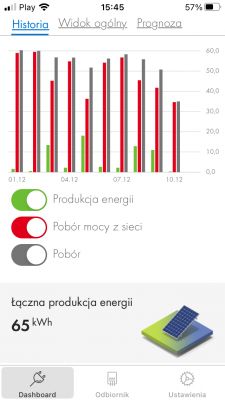I've also done the off-grid theme. Someone once wrote here that building something like this is fun for people who have nothing to spend money on and these days we don't have electricity for 2-3 hours? And these are sacred words.
I was about to spend 6,000 because I was also keen on it. Fortunately, I only bought two new agm 100Ah batteries and the IPS1000sin power supply, which is probably the best on the market in terms of configuration. You can set the multi-range charging current, the battery discharge voltage from perhaps 9v to 11.5V, the charging voltage, e.g. up to 13.5V, so as not to overcharge the battery and many others. Conscription for the so-called standby 5W. bypass etc. And it does the job, if there is no electricity, the TV, some lighting and the stove work for 10 hours, I don't really care about anything else, because I pay PLN 130 a month for electricity - so it's not a fortune. I was more concerned with the comfort of living because I have three ladies at home and they are afraid of the dark (wife and daughters).
I had already bought 3 330W panels (but I canceled the shipment) cost PLN 2300, I wanted an inverter sinus pro 1500s with Volt PLN 1500, these two batteries PLN 1200, mounting rails, cables and the rest 500. And probably something else would pop up.
I calculated it and say this: pay for the pv system PLN 3000-3500 just to charge the battery? stupidity. and here's why:
1. batteries have a limited number of cycles that you wouldn't buy with 24h daily use 2-3 years and beyond. There is no more 1200PLN.
2. the electricity that these panels produced, let's say for free in good conditions, is so common sense: you could connect a receiver with a power of 200W, above that it was already selected from the battery.
3. the converter from Volt, but not only (this parameter is often not specified by the manufacturer) takes a lot of current both in standby and even more so during operation. What's the point: let's assume I have a TV connected to off grid permanently. I use it, say, 12 hours a day. 8 hours during the day, let's say "for free" and 4 hours after dark using the energy stored in the battery. The batteries will be recharged at night through the mains converter, because they cannot be discharged for a long time - this will shorten their life. After calculation, it turns out that recharging the batteries through the inverter at night is more expensive than the money saved on electricity while the TV set worked at 8 hz pv. (a super simplified example to understand how it works)
3. We usually assemble such a device ourselves (if anyone has any idea), but we often use knowledge from the net. Well, remember that we assemble the converter, e.g. in the garage. We do not know this device, it is under voltage all the time, there may be a short circuit, e.g. due to an error in calculations, or incorrectly selected panels, cables, resistance calculations, etc. In short, it can cause a fire. There are a lot of flammable things in the garage or basement - you have to ask yourself is it worth it? for a toy for a few thousand, which in fact brings negligible benefits or even losses?
4, yes, you can disconnect the converter from DC and rely only on pv, but as I said, expensive batteries in such a concept will fail quickly, we have different weather, there are months that these batteries would be charged for 3 - 4 days. total nonsense.
Conclusions:
Off grid is a good thing but future-proof. Components are currently too expensive and inefficient. They will never pay off, because when we start, in an optimistic vision, to break even, it will turn out that we need to replace the panels, converters and certainly the batteries and we are still 5,000 in the red. A bit of a vicious circle.
That's why I bought myself a capacious warehouse in the form of 200Ah. A good power supply that takes a little power in standby, and actually it is turned off (I only check the battery charge from time to time) I turn it on when bad weather, winds, power outages are forecast.
Remember that a system like mine can always be expanded. All you need to do is buy a good MPPT regulator and panels.
And who knows, maybe one day I'll do it - if it's all a bit more common, because it's completely unprofitable at the moment.
I was about to spend 6,000 because I was also keen on it. Fortunately, I only bought two new agm 100Ah batteries and the IPS1000sin power supply, which is probably the best on the market in terms of configuration. You can set the multi-range charging current, the battery discharge voltage from perhaps 9v to 11.5V, the charging voltage, e.g. up to 13.5V, so as not to overcharge the battery and many others. Conscription for the so-called standby 5W. bypass etc. And it does the job, if there is no electricity, the TV, some lighting and the stove work for 10 hours, I don't really care about anything else, because I pay PLN 130 a month for electricity - so it's not a fortune. I was more concerned with the comfort of living because I have three ladies at home and they are afraid of the dark (wife and daughters).
I had already bought 3 330W panels (but I canceled the shipment) cost PLN 2300, I wanted an inverter sinus pro 1500s with Volt PLN 1500, these two batteries PLN 1200, mounting rails, cables and the rest 500. And probably something else would pop up.
I calculated it and say this: pay for the pv system PLN 3000-3500 just to charge the battery? stupidity. and here's why:
1. batteries have a limited number of cycles that you wouldn't buy with 24h daily use 2-3 years and beyond. There is no more 1200PLN.
2. the electricity that these panels produced, let's say for free in good conditions, is so common sense: you could connect a receiver with a power of 200W, above that it was already selected from the battery.
3. the converter from Volt, but not only (this parameter is often not specified by the manufacturer) takes a lot of current both in standby and even more so during operation. What's the point: let's assume I have a TV connected to off grid permanently. I use it, say, 12 hours a day. 8 hours during the day, let's say "for free" and 4 hours after dark using the energy stored in the battery. The batteries will be recharged at night through the mains converter, because they cannot be discharged for a long time - this will shorten their life. After calculation, it turns out that recharging the batteries through the inverter at night is more expensive than the money saved on electricity while the TV set worked at 8 hz pv. (a super simplified example to understand how it works)
3. We usually assemble such a device ourselves (if anyone has any idea), but we often use knowledge from the net. Well, remember that we assemble the converter, e.g. in the garage. We do not know this device, it is under voltage all the time, there may be a short circuit, e.g. due to an error in calculations, or incorrectly selected panels, cables, resistance calculations, etc. In short, it can cause a fire. There are a lot of flammable things in the garage or basement - you have to ask yourself is it worth it? for a toy for a few thousand, which in fact brings negligible benefits or even losses?
4, yes, you can disconnect the converter from DC and rely only on pv, but as I said, expensive batteries in such a concept will fail quickly, we have different weather, there are months that these batteries would be charged for 3 - 4 days. total nonsense.
Conclusions:
Off grid is a good thing but future-proof. Components are currently too expensive and inefficient. They will never pay off, because when we start, in an optimistic vision, to break even, it will turn out that we need to replace the panels, converters and certainly the batteries and we are still 5,000 in the red. A bit of a vicious circle.
That's why I bought myself a capacious warehouse in the form of 200Ah. A good power supply that takes a little power in standby, and actually it is turned off (I only check the battery charge from time to time) I turn it on when bad weather, winds, power outages are forecast.
Remember that a system like mine can always be expanded. All you need to do is buy a good MPPT regulator and panels.
And who knows, maybe one day I'll do it - if it's all a bit more common, because it's completely unprofitable at the moment.




